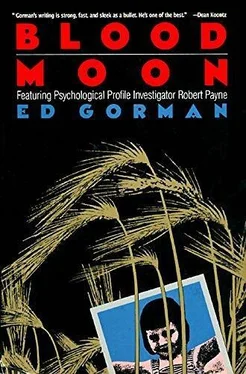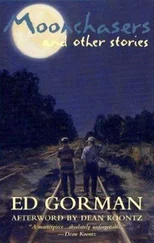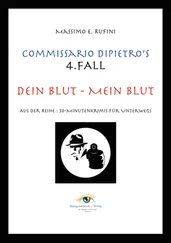In the morning, Renzler finds Angel (he hears about all this later from other cons) and falls on the floor and goes into some kind of seizure.
They never seen nothing like it before, except one con who once saw a sixth-grade girl at Catholic school have an epileptic fit.
The guards come running and they see Renzler there on the floor, and it takes four of them to hold him down.
Finally, finally, he stops screaming and throwing himself around.
Then he gets real quiet, tears streaming down his cheeks and he looks at one of the guards and says, “You gotta loan me a knife so I can kill her.”
The guard looks over at Angel there on a pile of bloody rags. Some bastard has cut all her poor little legs off. Amazing that she’s still alive.
The guard, this big thick German not known for sensitivity, has tears in his own eyes looking down at the obscenely maimed animal, and nods, and takes out this big-ass pocket knife, one of those gizmos that have a dozen different blades on them for opening cans and wine bottles and stuff like that, and he hands Renzler the knife. It’s certainly up to the job. The blade is six inches long.
And Renzler gets down there with Angel and he kisses her sad scared little face and he says a couple of parts of a couple of different prayers and then he rolls her gently over for a better take on her heart and then he kills her.
And then he sits down right in the middle of the floor and he picks Angel up like she’s his little baby or something and he starts rocking her back and forth in his arms and he’s crying these really eerie quiet tears and kind of singing some lullaby he remembers his mama singing to him and the big German guard hasn’t noticed as yet that Renzler hasn’t given him the knife back and then—
And then it’s too late.
Because Renzler picks up the knife, the blade still shiny with poor little Angel’s blood, and he brings the knife up to his right eyeball and drives it deep into his eye socket, right on through to his brain.
He screams, but not for long.
And then there’s two of them dead: Renzler flat on his back now, his foot twitching crazily, little Angel hugged tenderly to his chest.
Eight days later, he gets a new cellmate.
Hard-core criminal, this one.
Killed a man in a 7-Eleven stickup.
Brags so much about his sexual conquests, he quickly gets marked as a latent fag.
But what a relief to hear about stickups and dangerous guys his new cellmate has known and all the girls he’s bopped—
Certainly preferable to slow, sad Renzler, whining about his farm and his fantasies about getting out of here someday and how little Angel was sent to him directly by God.
Oh, yeah, this new cellmate is a lot better.
I reached New Hope next morning, just in time to see an Amish couple in a horse-drawn wagon irritate the hell out of a nice-looking young mother in a shiny new van. She had her kids with her and was obviously in a hurry. The wagon wasn’t about to go any faster, there was too much oncoming traffic for her to pass, so all she could do was crawl along at 10 mph and glower a lot.
As I would soon find out, this little drama was sort of a metaphor for life here.
Yes, New Hope was one of those beautiful old Iowa towns that had sprung up along with the railroad back in the 1870s, a town square complete with bandstand and Civil War monument; huge oaks and elms forming a natural canopy on the main drag; and striped awnings on all the proud little businesses that lined the four-block downtown, the men’s haberdashery, the supermarket, the ice-cream store, the tobacco shop.
This was the bucolic New Hope, the New Hope that existed in the secret heart of everybody who had ever grown up, like me, in the small-town Midwest, all long, lazy sunny afternoons fishing, and chilly football Friday nights out at the ramshackle old stadium, and Christmas carols on the loudspeaker as you jostled for gifts at the town’s one-and-only department store, which was basically four big rooms with a lot of different stuff piled into it. And the Amish, of course, their horses clopping hollowly down the asphalt roads, the pretty women peering out from beneath their dark bonnets, the men in coarse gray beards and inscrutable eyes.
The old New Hope.
The new New Hope was McDonald’s and Burger King and Motel 6 and the video stores with lurid sexy posters in their windows; Wal-Mart and a four-screen movie theater and what was formerly a furniture store converted into SOCIAL SERVICES.
Where the old New Hope belonged to the people who lived in town and worked at one of the three local factories, the new New Hope, its homes built in the hills surrounding the town itself, belonged to the married couples in their thirties and forties who drove their BMWs and Audis and vans to Cedar Rapids, where they worked, rubbed shoulders with as much modern culture as you could find there, and then escaped every night to live out their fantasies of Andy and Opie and Barney and Aunt Bea.
There were inevitable clashes, the nastiest, I’m told, coming when two members of the school board pronounced themselves “born again” and proceeded to list twenty-six novels, including The Great Gatsby and Catch-22 , that had to be stricken from the high-school curriculum. If nothing else, this move got all the young professionals interested in the governance of the small community where they lived. They announced that two years from now at this time, they would be fielding their own school-board candidates, and they sure as hell wouldn’t be people who found Mark Twain “sinful.”
Welcome to New Hope, located in the northeast corner of the state, pop. 14, 683.
There was a motel right downtown, a good base to work from, pretty much equidistant between the old New Hope and the new housing developments in the hills surrounding it.
The drive had been four hours, so I needed food and coffee. I decided to try the downtown to get a human sense of the place. The downtown of any place, no matter its size, is where you can get your quickest sketch of a town’s sociology.
I had two eggs, basted, two pieces of wheat toast with raspberry jam, one glass of orange juice, and three cups of coffee.
I ate these at the counter of a tiny place called Dickie’s Diner where, nearing noon, most of the customers were male, roughly half of them dressed in the kind of suits and sports coats you get at Sears, the other half dressed in uniforms of denim, khaki, cotton, all bearing the caps and sew-on badges of gas companies and electric companies and bug-spraying companies. Mixed in with these folks were farmers, all weather-lined faces and big knuckly hands wrapped around chipped white coffee mugs. Not a single young professional in sight.
The talk, as I picked it up in snatches, was about a new state sales tax the legislature was proposing and what a bunch of worthless idiots that legislature happened to be, and how bad most of the National League teams looked this year, and — this from the businessmen — how the young professionals thought they were too good to shop in downtown New Hope. “They do it all in Cedar Rapids. Not one goddamned bit of support for us!”
Near the end, just as the third cup of coffee was starting to put a little twitch into my fingers, I heard a name that sounded familiar.
“Eve McNally find that husband of hers yet?”
A snort of laughter. “Not unless she knows how to crawl through sewers.”
“How a man can do that to a woman like Eve sure beats me.”
“I really thought the last time he went down to Iowa City to dry out, he’d be all right.”
Читать дальше









